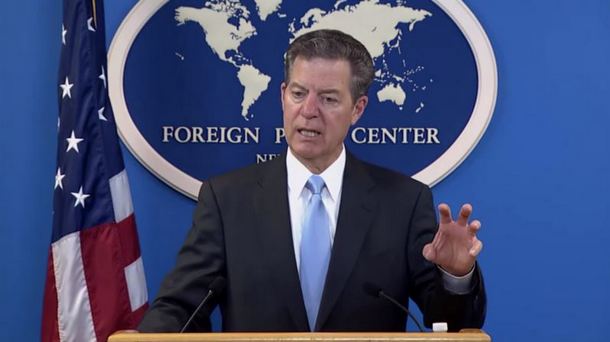Washington DC — The U.S. Ambassador for International Religious Freedom Sam Brownback again condemned China’s escalating, systematic and state-sanctioned suppression of religious freedom, calling it a “war on faith.”
“They are conducting a war on faith. It’s a war that they will not win,” Ambassador Brownback said earlier on Monday during a State Department briefing on “Promoting International Religious Freedom”, an initiative sidelining the UN General Assembly.
Brownback’s speech joins a growing tide of international condemnation of China’s ongoing egregious repression of religious groups including Tibetan Buddhists, Uighur Muslims, Christians, and Falun Gong practitioners.
China ranked second in the top ten “countries of particular concern” designated by the US Commission on International Religious Freedom in April 2019. China has been designated as a “country of particular concern” since 1999.
The US ambassador at large also raised concerns over the growing repression and surveillance of Tibetan Buddhists as well as China’s Christian community and the Falun Gong practitioners.
“Unfortunately it’s not just the Uyghurs, it’s also the Tibetan Buddhists, which you’ve heard, its Falun Gong, the organ harvesting issue that China still would not come forth about, it’s house churches,” Brownback said.
A number of prominent dissidents also spoke at the press briefing, including Nyima Lhamo, human rights advocate and the niece of the late Tulku Tenzin Delek Rinpoche, a highly revered reincarnate lama who died in a Chinese prison in July 2015, and Uyghur human rights advocate Jewher Ilham.
“One thing I have learned after coming to the West … is that suffering is not just our family alone or my community alone. Religious freedom is being violated all over the world,” said Nyima Lhamo. She was assisted by Bhuchung K Tsering from International Campaign for Tibet for interpretation.
Jewher Ilham, an Uyghur Muslim urged world governments to work together to allow all religious dissidents in China to practice their religion, or to speak the language they want to speak, dress the way they want to dress, eat the food they want to eat, behave the way they want to behave, freely.
Amb Brownback stressed that the U.S. administration has made protecting international religious freedom a top priority, noting that President Donald Trump earlier on Monday held the first-ever president-led event on religious freedom at the United Nations General Assembly.
Restrictions on religious freedom have a direct and significant impact on Tibetans inside Tibet. Spiritual pilgrimages to sacred sites are strictly controlled by the communist-authoritarians and it has become almost impossible for Tibetans to obtain permission to attend religious teachings in other countries. Mining or other resource exploitation on sacred sites is commonly permitted and often provokes protest.
Large gatherings of Tibetans are perceived as a threat by the authorities of the Chinese totalitarian regime. As a result, heavily armed security forces are often deployed at prayer festivals and other religious gatherings. The bodies of self-immolation protesters who died at the scene or in custody are often cremated by Chinese police to prevent traditional religious ceremonies and prayer services can be banned.
The totalitarian regime in China asserts its right to control one of the fundamental aspects of Tibetan Buddhist belief: reincarnation. There are thousands of reincarnated “lamas” in Tibet and China’s communist-atheist regime claims the right to “approve” them all. It also plans to control the most important reincarnation of all: the leader of Tibetan Buddhism, the Dalai Lama.
The Chinese Communist totalitarian regime (PRC) began their invasion of Tibet in 1949, reaching complete occupation of the country in 1959. Since that time, more than 1.2 million people, 20% of the nation's population of six million, have died as a direct result of China's illegal invasion and ruthless occupation. In addition, over 99% of Tibet's six thousand religious monasteries, temples, and shrines, have been looted or decimated resulting in the destruction of hundreds of thousands of sacred Buddhist scriptures.


![Tibet has a rich history as a sovereign nation until the 1950s when it was invaded by China. [Photo: File]](/images/stories/Pics-2024/March/Tibet-Nation-1940s.jpg#joomlaImage://local-images/stories/Pics-2024/March/Tibet-Nation-1940s.jpg?width=1489&height=878)
















